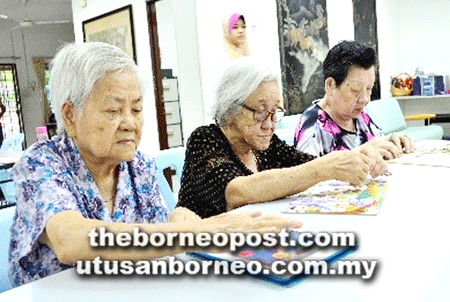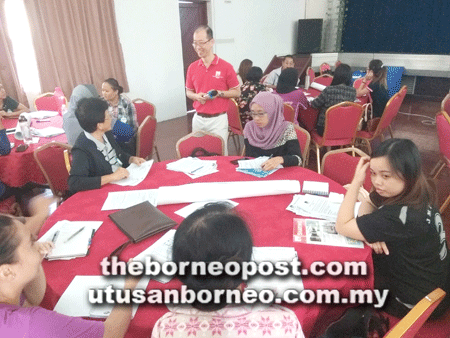
Dr Tiong (seated, third left) with ADFM representatives and the workshop participants comprising family care-givers, professional nurses and allied health care workers.
THERE is a Chinese proverb that says “the household with its own elder, indeed, has its own adornment” — which tells us how precious it is to have an elder in the family.
But there’s a flipside as affection and forebearance can be severely tested when it comes to looking after an elder who is disabled or sick — and it’s no less true in the case of caring for a dementia-ravaged old timer.
While dementia is often mistaken as one of the signs of aging, it’s important to understand the symptoms leading to the debilitating affliction.

Activity session helps the elderly to keep their mind active.
Care-givers need help too
Lynette (name has been changed) has lived through a long and painful time as result of her mother’s dementia.
A successful career woman, her work usually took up most of her time.
“I was good in juggling work and family time. More importantly, my confidence was my forte,” the retired civil servant told a recent Alzheimer Workshop in Miri.
Lynette admitted she had overlooked the early symptoms of dementia her mother was showing and as a result, her health deteriorated over time.
“I must confess I had ignored the symptoms in the early stages. I was too engrossed in my career to notice she was having hallucinations and fears, and the tendency to talk about random things. It saddened me to see my mother, a loving person, becoming a totally different person,” she said.
Hallucination, mumbling about trivia, delusion of persecution and defensive behaviour such as spitting and grabbing at people, were some of her mother’s problems Lynette had not prepared for, and she admitted she had a hard time trying to cope.
“Sometimes, she claimed there were people trying to harm her and because of such perceived fears, she tended to chase the people in her life away.
“When she was upset, she would spit everywhere to show her anger, making the whole place very messy.
“I’ve personally experienced her irrational behaviour. Once she grabbed me and I ended up with open wounds that left scars on my arms,” she recalled.
However, after her mother’s health got worse, Lynette decided to spend more time caring for her although it was physically and emotionally draining.
“Hearing about the predicaments of others and facing one yourself is totally different.
“When dealing with a dementia patient in your own family, there were times you didn’t know what to do. I felt lost and sad — like I was letting my mother down.
“Many times, my family and I didn’t know what to do but I continued to care for my mother. It was exhausting.”
Despite the ups and downs and with the help of a geriatrician, doctors, nurses and medication, her mother’s condition improved.

Senior citizens having their morning exercise at ADFM’s Petaling Jaya daycare centre.
Heart-wrenching
Lynette recalled how her mother would suddenly remember her as her daughter and it was heart-wrenching!
“One day, she told me she still remembers me and that I was a kind person. The words were simple, yet so powerful. I was reduced to tears.”
She said when her mum wasn’t in a good mood, she would cook her favourite food for her — or something she loved like shepherd pie.
“Dementia patients tend to respond to food which probably connects them with certain memory. I felt relieved I did things the right way.”
Lynette felt compelled to speak out about her experience as she wanted help people in a similar situation.
“Instead of allowing my emotions to be influenced by the behaviour of the patient, I tried to keep my composure and learned to be more patient — of course with professional help.
“I kept telling my mother she was okay and safe and everything she feared was not going to happen.”
She said in this regard, she found the psychological support from doctors and nurses to be crucial.
“There was a time I called the doctor for my mother’s next appointment. The doctor asked me to tag along. I didn’t respond at first but the doctor persuaded me to be present, saying he needed to see how I was doing as a care-giver.
“It was a simple and short conversation but I felt it showed a lot of compassion and empathy towards the care-giver — that his or her feelings and mental health matter too,” Lynette said, adding that she appreciated what the doctors and nurses had done for her and her mother.
Her story she shared at the workshop had several of the attendees in tears as they could relate to her situation.

Dr Tiong talking with workshop participants.
Support group
According to Kuching-based geriatrician Dr Tiong Ing Khieng, one of the two ADFM (Alzheimer’s Disease Foundation Malaysia) trainers, conducting the Dementia Care Skills Training Workshop in Miri recently, dementia is certainly not part of ‘normal ageing’.
Dementia is described as a loss of mental ability, associated with gradual death of brain cells that causes problems relating to memory, language skills, information, processing, mental agility, understanding and judgement.
“It’s important for family care-givers to understand dementia could also trigger other problems such as personality changes, anxiety, mood swings and in the worst case, loss of ability to even do ‘normal’ routine things like eating, drinking and moving around.
“Without proper diagnosis and medical attention, the condition will get progressively worst, and over time, the sufferers will rely increasingly on their care-givers.
“While treatment often focuses on the person living with dementia, government hospitals are now constantly reaching out to care-givers as well as they play an important part in the treatment process,” Dr Ting said.
A healthy living environment is important to both patient and care-giver because an ‘imbalance’ can lead to an unhealthy living environment such as domestic violence.
“The Malaysian government is always striving to look after patients and their families. In the case of dementia, because the person affected can grow to become totally dependent on the care-giver, it becomes more than merely a simple case of hiring a stranger (or nurse or care-taker at random) to provide care.
“There are times when the inability to adapt to different people and circumstances can cause the condition of the dementia-stricken to become severe,” he added.
As for the family care-giver and the professional nurse or allied health care workers, Dr Tiong said such a support group was a good channel to reach out to others in the same boat.
“A support group is an avenue where those taking care of dementia patients can connect with others in the same situation, to share their experiences and let go of their bottled-up feelings.
“Caring for a person with dementia often puts the care-giver in a very demanding and stressful situation. The behaviour exhibited by the sufferer is also unpredictable.
“As care-givers, it’s vital to be prepared and educated on dementia and Alzheimer’s diseases, learn about the challenges and what to expect because as the disease progresses into advanced stages, the sufferer will become dependent on the care-giver.
“Without a head-start on what to expect, it could be burden to the care giver — both physically and emotionally,” Dr Ting pointed out.

Senior citizens having their morning exercise at ADFM’s Petaling Jaya daycare centre.
More support groups
In Malaysia, there are seven support groups under the ADFM such as the Dementia Society of Perak, the Johor Bahru Alzheimer’s Disease (AD)Association (JOBADA), the Penang AD Support Group, the Malacca AD Support Group, the Sabah Alzheimer’s Disease Support Association (SABAH AZ), the Kelantan Dementia Family Support Group and the Seremban (Negeri Sembilan) Dementia Family Support Group.
Several others are in the process of being set up such as in Kuantan (Pahang) and Kuching.
ADFM’s aim to form support groups in more states in the country to encourage, support and facilitate these groups to function independently.
Private practitioner Dr Loh Yunn Hua, who runs a daycare home for the elderly in Miri, said as a first step, a support group could be set up on a small scale to connect like-minded people through the Internet.
“It would be good to have a support group in Miri that caters for care-givers who are under stress and need support and sharing.
“One of the benefits of having support groups is that through face-to-face interaction, care-givers can gain ‘hands-on’ experience and exchange practical tips with each other on coping with their situation.
“Thus, it’s a great way to update on advances and learn along the way,” Dr Loh added.

Karaoke session is a great way to interact with peers for people living with dementia.
Care-givers support network
ADFM operates and manages two support services through the Internet and telephone.
The primary objective is to reach out to care-givers and families of people living with Alzheimer’s disease and dementia in their hours of need, and to areas where there are no care-giver support groups due to geographical distances.
The network is an online borderless platform that gives care-givers and families access to relevant information on AD and dementia, seeks peer’s advice on challenges and problems encountered, vents frustrations and emotions, and keeps abreast of ADFM’s on-going programmes and activities.
Care-givers and families of dementia patients can join the online community platform which provides connections to share their stories and support each other.
Presently, the online network has more than 1, 500 family care-givers as members. Those interested can sign up at admalaysia.ning.com.
ADFM also provides helpline 603 7931 5850, a free and confidential service for support, information and referral services which is especially useful for people who do not have Internet access or need help to use it.
The helpline also provides a fast and cost-effective means of communication for care-givers to seek information and support.
